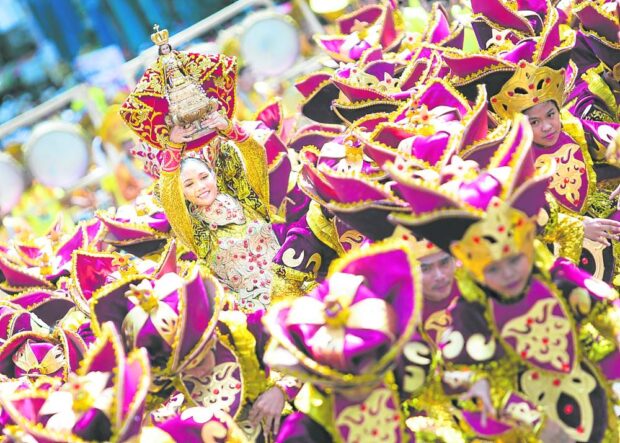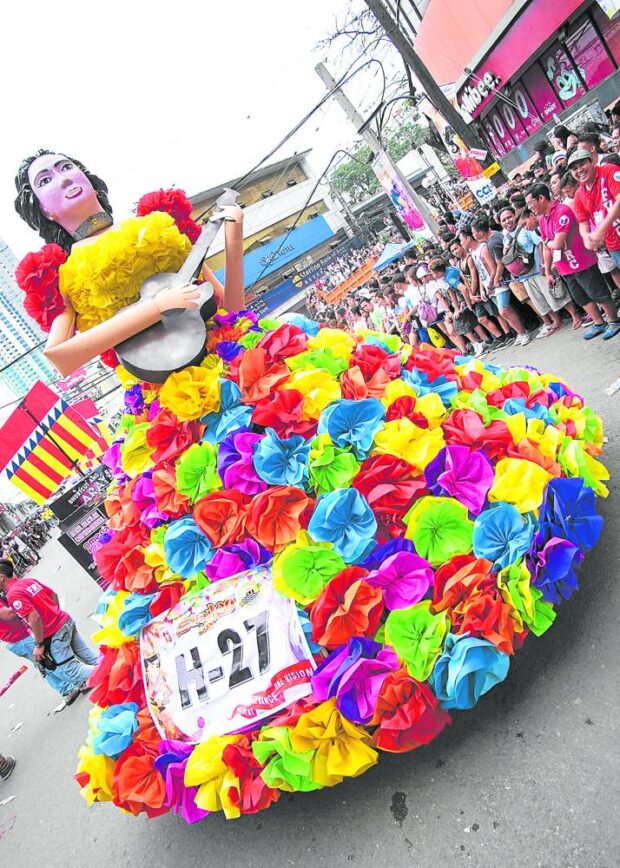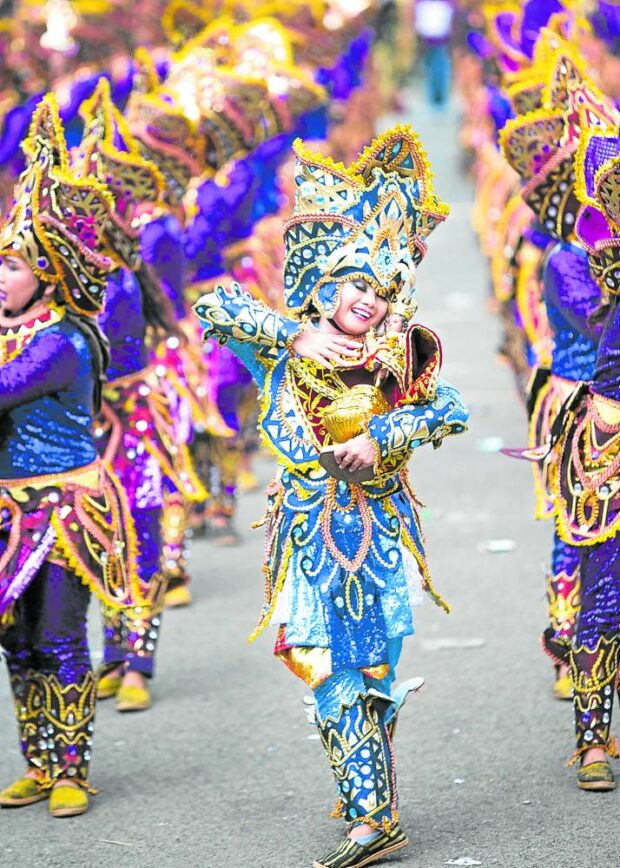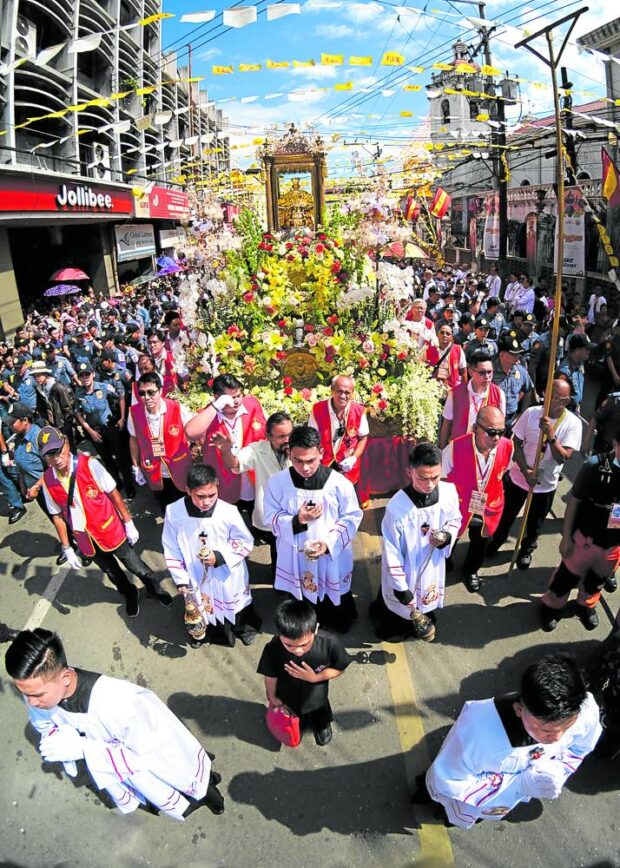Sinulog then and now: The country’s biggest festival faces declining dance contingents

FAITH AND CULTURE | Dancers in colorful costumes perform during the grand parade of Cebu City’s Sinulog Festival in honor of the Sto. Niño. (Photo by EMMANUELLE SAWIT)
CEBU CITY, Cebu, Philippines — Buntings adorn the streets and lively music fills the air in Cebu City. Today, the Queen City of the South is hosting a massive fiesta celebration featuring Sinulog, a renowned festival that has been a major attraction for over 40 years. It is often considered as the “Mother of All Philippine Festivals.”
However, for the second consecutive year, there has been a decline in the participation of dancing groups in the grand parade and ritual showdown. The number of contingents has dropped from over 40 in previous years to below 20.
Records from the Sinulog Foundation Inc. showed that only 17 dancing contingents joined in this year’s Sinulog—just a contingent more than last year’s Sinulog Grand Parade.
And for the second time in a row, contingents from Cebu province will not be joining the Sinulog Grand Parade. Even the top winners of the Sinulog sa Panlalawigan held on Jan. 14 will skip today’s event.
Sinulog sa Panlalawigan is one of the events leading to the Sinulog Grand Parade, the culmination of the 11-day festivity, where winners of the provincial government-led activity usually compete.
Contingents from the province started skipping the grand parade and ritual showdown last year when Cebu City Mayor Michael Rama moved the venue from the Cebu City Sports Center (CCSC) to the South Road Properties (SRP).
Gov. Gwendolyn Garcia said the mayors and choreographers of 17 dancing contingents from the province felt that the vacant lot at the SRP was too muddy and unsafe for participants.
Rama, however, stood firm on his decision to hold the grand parade and ritual showdown at the SRP for the second straight year to accommodate more revelers and to give way to the renovation of the CCSC in time for the city’s hosting of Palarong Pambansa this year.
Ritual prayer
Sinulog, which has been celebrated for 44 years, started as a ritual prayer and dance to the Sto. Niño that was given as a baptismal gift by Portuguese explorer Ferdinand Magellan to Cebu’s Queen Juana in 1521.
The dance later became a cultural and religious celebration, drawing millions of people to Cebu every third Sunday of January.
While this year’s celebration is called “Sinulog sa Sugbo Philippines 2024,” only four of 17 dancing contingents are from out-of-town while one comes from Talisay City, Cebu.
Rama, however, said he was not disappointed that only a few contingents joined in the grand parade which will cover a 4.1-kilometer route around the SRP, longer than last year’s 3.7 km.
The SRP, the city’s gateway to south Cebu, is a 300-hectare reclaimed area that connects Cebu City to Kawit Island that hosts Nustar Resort and Casino, the first integrated resort in the Visayas and Mindanao.
Despite these logistical kinks, Rama says Sinulog will never become irrelevant as it is celebrated to honor the Holy Child Jesus.
“The Sinulog is about the Sto. Niño, not me, not the mayors all over, not the governor. Sinulog is Sto. Niño. I will stand for my faith in Sto. Niño,” he said.

LOCAL PRODUCT |One of the “higante” (giant) models in a previous staging of the Sinulog Festival in Cebu City features a woman playing a guitars. The festival also features the top products of the island of Cebu. (Photo by EMMANUELLE SAWIT)
Competition
One of the 17 contingents taking part in this year’s Sinulog Grand Parade is the Lumad Basakanon of Barangay Basak San Nicolas in Cebu City, last year’s second place in the best in ritual showdown (free interpretation) category and in street dancing; and winner in best in musicality.
The others are contingents from Barangays Guadalupe, Banilad, Binaliw, Inayawan, Mabolo, Suba, Labangon, San Roque, Sapangdaku, San Nicolas Proper and T. Padilla.
Tribu Divinohanon of Divino Amore Academy, a Catholic school in Talisay City, is also joining the competition.
The out-of-town contingents are Pasayaw Festival of Canlaon City, Negros Oriental, and Tribu Kamanting Performing Arts Guild of San Jose town, Dinagat Island. Two other out-of-town groups—Bacolod City’s Masskara Festival and Chunchun Nongak Preservation Association of South Korea—are participating as guest contingents.
Aside from the 17 dancing contingents, Sinulog 2024 also drew in 31 floats, 14 “higantes” (paper mache giants), and 10 puppeteers.
Rama has also increased the prizes in the Sinulog ritual showdown: from P1 million to P3 million for first place; from P700,000 to P2 million for second place; from P500,000 to P1.5 million for third place; from P300,000 to P1 million for fourth place; and from P200,000 to P750,000 for fifth place.
Among the prominent out-of-town contingents absent in this year’s Sinulog are past winners Sinanduloy Cultural Troupe from Tangub City in Misamis Occidental; Kulturang Placereño and Tribu Himag-ulaw of Placer town in Masbate; Tribu Pintaflores of San Carlos City in Negros Occidental; and the Omega de Salonera contingent from Surigao del Norte which brought home the grand prize last year.
Councilor Jocelyn Pesquera, head of Cebu City’s committee on tourism, said the number of contingents had dropped since the COVID-19 pandemic hit the country in March 2020.
“Local governments are still recovering from the pandemic. They [want to] prioritize their needs. Some places started from scratch and their dancers have relocated elsewhere,” she said.
Despite this, Pesquera said hotels in the city remained booked with the arrival of tourists and balikbayans who wanted to continue with their devotion to the Holy Child Jesus.
Elmer “Jojo” Labella, executive director of Sinulog Foundation Inc., said this year’s Sinulog saw improvements in all aspects of the festival such as the venue, route, traffic and crowd management.

ICON A woman dances while holding the image of Sto. Niño de Cebu in a previous Sinulog
performance.
Festival roots
Sinulog’s original dance—one step forward, two steps backward—is patterned after the ritual called “sinug” (waves), a dance prayer performed before the image of the Sto. Niño.
Based on historical accounts, the Sinulog dance steps originated from Rajah Humabon’s adviser Baladhay who was found dancing right after being “cured of his sickness” by the image of the Sto. Niño.
In 1980, the first Sinulog parade was organized by David “Boy” Odilao Jr. then regional director of the Ministry of Sports, and Youth Development.
To get “Sinulog sa Sugbu” started, he tapped students of colleges and universities as dancers while their teachers served as choreographers.
Odilao, considered the “Father of Sinulog” for elevating the ancient Cebuano prayer dance to a festival, said dancers then wore Filipiniana costumes and brought handkerchiefs and candles as they danced to the beat of drums.
In an earlier interview, Odilao recalled that he conceptualized the “Sinulog sa Sugbu” to give Cebuanos a festival distinct from other festivals that also honored the Sto. Niño like the Ati-Atihan in Kalibo, Aklan, and the Dinagyang in Iloilo.
Odilao said he wanted Sinulog to focus on “veneration” to the Holy Child Jesus.
On Saturday, people lined the streets of Cebu City and joined the 6-km solemn procession held on the eve of the feast of the Child Jesus.
Earlier in the day, thousands of people also waited in piers and along shorelines in the cities of Mandaue, Lapu-Lapu and Cebu to watch the fluvial procession—one of the highlights of the Fiesta Señor.
Cebu Archbishop Jose Palma has called on devotees of the Child Jesus to persevere in prayer and to never give up amid obstacles.
“Thanks to the image of the Sto. Niño. Among several places, Cebu was the first to accept it. Through the years, our devotion to the Child Jesus has grown. We should continue to pray to the Sto. Niño. We believe that, if it would be for good, He shall grant it,” Palma said.
READ MORE: Sinulog sa Kabataan sa Dakbayan 2024 live updates
Disclaimer: The comments uploaded on this site do not necessarily represent or reflect the views of management and owner of Cebudailynews. We reserve the right to exclude comments that we deem to be inconsistent with our editorial standards.

